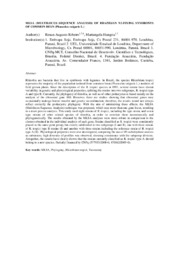MLSA (Multilocus Sequence Analysis) of brazilian N2-fixing symbionts of common bean (Phaseolus vulgaris L.).
MLSA (Multilocus Sequence Analysis) of brazilian N2-fixing symbionts of common bean (Phaseolus vulgaris L.).
Author(s): RIBEIRO, R. A.; HUNGRIA, M.
Summary: Rhizobia are bacteria that live in symbiosis with legumes. In Brazil, the species Rhizobium tropici represents the majority of the population isolated from common bean (Phaseolus vulgaris L.) nodules of field grown plants. Since the description of the R. tropici species in 1991, several strains have shown variability in genetic and physiological properties, splitting the strains into two subgroups, R. tropici type A and type B. Currently, the phylogeny of rhizobia, as well as of other prokaryotes is based mainly on the analysis of the ribosomal gene 16S. However, there are studies showing that ribosomal genes may occasionally undergo lateral transfer and genetic recombination; therefore, the results would not always reflect correctly the prokaryotic phylogeny. With the aim of minimizing these effects, the MLSA (Multilocus Sequence Analysis) technique was proposed, which uses more than one gene locus, resulting in a more precise analysis. This study used eight strains of R. tropici, including the type strain, and seven type strains of other related species of rhizobia, in order to correlate them taxonomically and phylogenetically. The results obtained by the MLSA analyses were more robust in comparison to the clusters obtained in the individual analysis of each gene. Strains classified as R. tropici were consistently placed in the same great group, but clearly subdivided in two subgroups (I and II), one with three strains of R. tropici type B strains (I) and another with three strains including the reference strain of R. tropici type A (II). Physiological properties were also investigated, comparing the use of 49 carbohydrate sources as substrates; high diversity of profiles was observed, showing consistence with the subgroup division. Altogether, the results have clearly shown that the strains currently classified as R. tropici type A should belong to a new species. Partially financed by CNPq (577933/2008-6; 470162/2009-0).
Publication year: 2010
Types of publication: Abstract in annals or event proceedings
Unit: Embrapa Soybean
Keywords: Filogenia, Fixação de nitrogênio, MLSA, Nitrogen fixation, Phylogeny
Observation
Some of Embrapa's publications are published as ePub files. To read them, use or download one of the following free software options to your computer or mobile device. Android: Google Play Books; IOS: iBooks; Windows and Linux: Calibre.
Access other publications
Access the Agricultural Research Database (BDPA) to consult Embrapa's full library collection and records.
Visit Embrapa Bookstore to purchase books and other publications sold by Embrapa.

